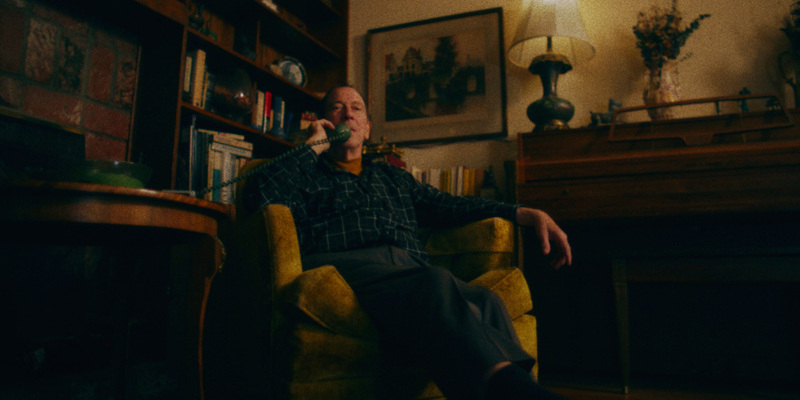
Review by
Eric Hillis
Directed by: Joe DeBoer, Kyle McConaghy
Starring: Sterling Macer, Jr., John Fleck, Susan Priver, Micki Jackson, Tomas
Boykin, Nick Heyman

In the 1980s, American TV was filled with detective shows, and the
protagonists weren't always actual detectives. Any profession could be
reworked into a procedural drama. Take for example,
Lottery!, which revolved around a lottery company employee's efforts to track
down the winners of unclaimed prizes. It doesn't sound like the most
riveting basis for a show, and yet it was as flamboyant and over the top
as any '80s media.
The opening act of Joe DeBoer and Kyle McConaghy's 1980s
set thriller Dead Mail plays like the pilot episode for a
similar show, this one focussing on a profession I have to admit I've
never given any thought to – a lost letter investigator.
The job is held by Jasper (Tomas Boykin), a middle-aged man who
plies his trade in the basement of the Peoria, Illinois central post
office. DeBoer and McConaghy's vision of this institution is
significantly detached from reality, with a series of underground
corridors that make the building seem like the Pentagon. Huddled away in
a subterranean office is Jasper, who spends his days following clues to
track down the destination of misplaced, or "dead" mail, sometimes with
the help of Renée (Nick Heyman), a Norwegian computer wiz
similarly bunkered across the Atlantic.

DeBoer and McConaghy show us an example of Jasper's work as he tracks
down the intended recipient of a necklace lost in the mail. As it's the
1980s, his investigation is very much of the analog variety as he scours
phone books and maps and calls the met office for recent precipitation
reports. We're simply watching a schlubby middle-aged man working at a
desk, but it's thoroughly gripping. It helps that Boykin has a quiet
charisma in the role that's reminiscent of Morgan Freeman in
Seven.
The necklace isn't central to the plot, though it does play a key role
late on. Rather the film revolves around a bloody handwritten note that
finds its way onto Jasper's desk. In the prologue we see how it gets
there, as a bound man crawls across a lawn and deposits it in a post box
before another man pulls him back inside the house.

The film's second act is devoted to detailing the events that lead to
this incident, and it's something akin to Herbie Hancock being abducted
by the villain of a Thomas Harris novel. At a synthesizer convention,
keyboard wiz Josh (Sterling Macer Jr.) is approached by a
well-spoken enthusiast, Trent (John Fleck), who offers to become
Josh's benefactor in developing a new instrument. The two men get along
like a house on fire at first thanks to their mutual love of
electronically recreating analog instruments, and their early bonding
over '80s tech is similar to the geeky dynamic found in Andrew
Bujalski's similarly off-kilter '80s-set oddity
Computer Chess. There's a fetishisation of v/u meters, circuit boards and fanzines,
and as a lover of vintage audio equipment I have to admit I felt like I
was simultaneously being mocked and pandered to.
Things take a dark turn when Josh sells his prototype to a Japanese
company, leading to accusations of betrayal from Trent, who knocks him
out and locks him in his basement, forcing him to continue working on
the instrument in a delightfully nerdy twist on Stephen King's
Misery.

Dead Mail plays with the homophobia that often blighted
thrillers of the '80s and '90s with their queer-coded villains. It's
made explicitly clear that Trent has a crush on Josh, and there's an
uncomfortable racial element as the black synth wiz seems to stir
memories of white weirdo Trent's unrequited college romance with a
basketball player. Trent is clearly bonkers, but his queerness isn't
used as a cheap target in the way it most likely would have been had the
film actually been made in the '80s. Rather it casts a melancholy fog
over the film. There's something deeply tragic about Trent's affection
for Josh, summed up by his pathetic attempt to replicate Josh's
favourite meal of chicken teriyaki by serving what amounts to a few
chicken tenders atop a bed of rice. We're constantly reminded that this
is an era when being a middle-aged gay man often meant you were
condemned to a lonely existence. All three of Dead Mail's middle-aged central characters are lonely in their own ways. It's
rare in any genre to see male loneliness portrayed so vividly; you
certainly don't expect to find it in a blackly comic thriller like this.
Where else do you find middle-aged African-American actors cast in the
lead roles of an absurdist thriller?
Dead Mail opens with a fake intro designed to make us
think we've just popped a VHS tape into our player. Any worries that
we're in for the sort of cheap '80s nostalgia that's so popular today
are soon dispelled. None of the clichéd signifiers of the era are
present here – no leg-warmers, Rubik's cubes or BMX bikes. Instead we
get a film that's mired in the real life drabness of that decade, all
muted colours and terrible fashion choices. If you stumbled onto
Dead Mail by accident you'd be forgiven for believing you
had come across an early episode of Unsolved Mysteries. And yet for all its gritty realism, Dead Mail is
peppered with comedy, often the result of tweaking that realism ever so
slightly off balance. Dead Mail looks like it takes place
in the 1980s MidWest, but some things just aren't quite right. The best
way I can describe it is oxymoronically, as grounded absurdism. It's
often mystifying, but always gripping, and it's one of the most
distinctive pieces of work to emerge from American indie cinema in
recent years. I can't wait to see what these filmmakers do next.


